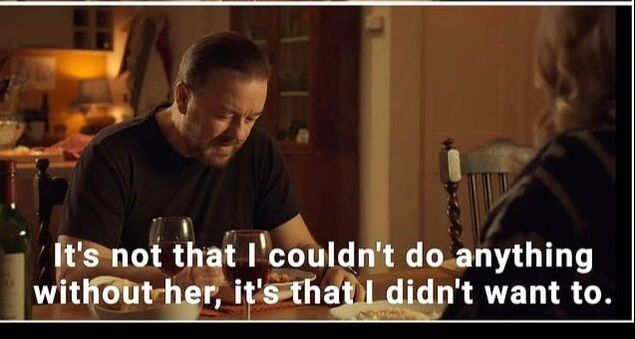 Netflix show: "After Life" Netflix show: "After Life" 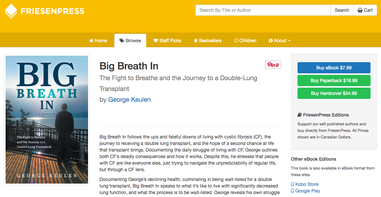 Note: This chapter is a bit long and a bit rambly. Sorry. Sorrow, depression, grief––these are all disorientating experiences that often leave one feeling like they are swimming in a swamp of their own emotions and experiences. It has been difficult to force myself to sit down and write this chapter of my journey with grief because it has been challenging to try and process and organize these more recent emotions and experiences into something that a reader might understand. It is like trying to reconstruct a meal after you have just vomited it into the toilet. But here we go... To try and make sense of the six weeks following Kim’s memorial, specifically the month of October, I will try and compartmentalize this time into three topics or categories. What I am writing about here are emotions and experiences I've had since Kim passed, but I am placing them within the chronological time frame of October as they were all triggered and intensified within one week in early October. On Accomplishment On Oct. 8, the Friday before the Thanksgiving long weekend, I had a meeting with my publishing specialist. Among the things we discussed about my book, we decided to push the release date up to early November. There were a couple of reasons for this, one of them having to do with supply chain issues and making sure the book would come out and be available for shipping before Christmas. But it was quite a startling moment to realize that this journey of publishing my book would end within a month. And with that, as soon as I hung up the phone, a wave of sadness washed over me. Part of the letdown that I experienced is, I think, the same as what many people have after a big project is completed. You are pushing and pushing, focused on this one big thing, and then there is an emotional letdown once finished. It is as if our emotions have nowhere to focus anymore, and we begin to slip into this sad or dark place. But more than this for me, what especially tripped me up and sent me down this slope of depression, was the meaninglessness of the accomplishment that I felt. Without Kim to see and experience this with me, it felt empty. Now don’t get me wrong. I have been humbled and so incredibly appreciative of all the positive feedback for my book. It is the only thing that is now keeping me excited and proud of this project. But the joy, the excitement, the sense of accomplishment I expected to feel, was absent. 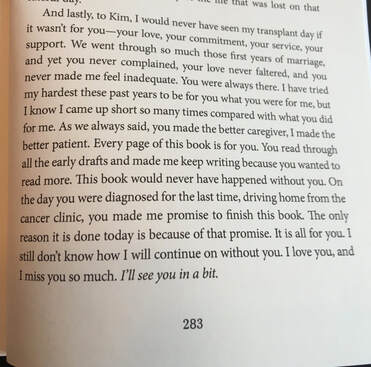 What kept me focused during the difficult early days of writing was Kim’s excitement and positive feedback to my early drafts. If you have read my book and read the very last page, you will know that when Kim was diagnosed for the final time, in August 2020, she made me promise to finish the book and to get it published. At that time, we had hoped we would have been able to do this together, but of course, that didn’t happen. Kim had a hand in editing my manuscript and giving her thoughts on the physical shape and design of the book, but she didn’t get to see any of the proofs. This sense of the emptiness of accomplishment was not new to me in October. Already in the summer, I shared with some people how it felt like nothing was worth doing if I couldn’t share it with Kim. Not until Kim was gone did I realize how much I enjoyed the things I did because I could share them and talk about them with Kim. Last week I met with my spiritual director and shared with him that I am not yet at the point where I can enjoy something just for the sake and dignity of it. I trust and hope I will one day get there, but still, now, my sense of accomplishment in life is attached to being able to share it with Kim. With her gone, my accomplishments don’t mean all that much. They are just a way to pass the time. I feel guilty for feeling this way, especially as it relates to my book. You, as my readers, have been purchasing my book and spending your money on it. Many of you are taking hours out of your life to read it, and I appreciate that so much! I don’t want to disrespect that. But when life changes so radically in the middle of an emotionally charged project, it’s hard to maintain the original spirit of accomplishment; it becomes tarnished. When I began writing, the dream I had was to do this with Kim. That dream is unfulfilled. 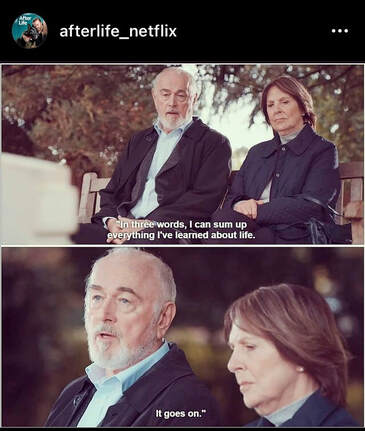 On Community Over the Thanksgiving weekend, a couple of people texted me, communicating their support and sorrow that a weekend so focused on the theme of gratitude must be difficult for me. That idea never actually really occurred to me until I got those texts. I’m not one for major holidays. I value the meaning behind them, but I'd rather focus on cultivating a spirit of thanksgiving throughout the year rather than artificially manufacturing it on one weekend. The same goes for Christmas. I like getting together with family, and that it feels special, but overall, whatever, I’m a bit of a scrooge. Therefore, I floated through the weekend without much thought to the contradiction of my grief and the weekend's theme of gratitude. All of this, however, left me unprepared for what did happen. My family got together the Sunday evening. We had a nice dinner, and we all had a good time. We finished up dessert, coffee, and drinks and were cleaning up. I then decided to make my exit. However, it was then that something I had done so many times before without too much thought or emotion hit me: I was going home alone. Now, of course, this was not the first time we had got together as a family since Kim died. And it had nothing to do with Thanksgiving. But that five-minute drive home served as a reminder and manifestation of just how lonely and empty my life, my future, felt. No matter where I went––family dinners, social outings, drinks with friends, work, or church––I was always coming home alone and walking into an empty house. It is as if the joy and laughs experienced during times of community, with family or friends, disappear into a vapour as soon as I get in my truck and the passenger door remains closed. When I leave the house for the evening, I always turn a light on so that at least there is some sense of warmth, of life, when I come home. But no matter how many lights I leave on or how good of a time I have when I am out, it can’t compete with the empty, silent house that awaits me. Often, which is a common thing for widowed people, when I come home from work, I will turn on Netflix or some music right away, and then I will go shower. I do this so that there is at least some noise in the house when I come back downstairs. Again, this wasn’t something new in October, and it is not always a painful experience to step into the house. Still, the grief about this reality was so much more profound, so much more depressing throughout October, especially on that Thanksgiving Sunday. And this leads me to my third categorization of the ever-deepening grief of that month. On Experience & Time Before these two experiences happened, another one actually set up the slide into the depression that I felt I was falling into for most of October. Since my transplant, I have been involved in advocacy work for Cystic Fibosis Canada, and for our local clinic here in Vancouver. During the summer, I decided to plug myself back into that advocacy work. Over the past couple of years, the big push in the CF world has been getting access to new medications coming online that are a real game-changer for people with CF, especially the latest one, Trikafta, a miracle drug for many people. The downside of these drugs is they are costly, therefore it takes a while for publicly funded healthcare systems to get on board with funding them. When I re-entered the world of advocacy this past summer, I joined in on the final push to get Canada and the province of BC to approve Trikafta and make it available for CF patients. To say that Oct. 5 was a milestone in CF care here in BC is an understatement, as this was the day that our provincial government approved Trikafta, thus changing the lives of hundreds of people here in BC. For me, however, this day came with mixed emotions. I was thrilled to be part of this final push to get this drug approved; I was happy for my CF peers, who can now have access to this drug, but for me, it comes too late, as being post-transplant, I do not qualify to be on it. On Oct. 6, there was a Facebook Live event to celebrate this momentous day, but I felt myself slipping into a pit as the meeting wound day. It was as if the bittersweet emotions of the day cracked open a dark door that was then quickly flung wide open by the realization that Kim would never know that this day in CF history happened. This idea and sorrow over Kim not knowing something was not new on that day. Already back in the spring, I came to the painful realization that everything that happens in life from here on out, Kim will not know about. Kim’s knowledge base, her experiences stopped on the day she died. I find it very painful that Kim doesn’t know what's happening in the world or in the life of those she loved. Kim doesn’t know about the heat dome or the wildfires of this past summer. She doesn’t know about the flooding and how it is affecting our family in Abbotsford. She doesn't know about the mundain ordinary things in life. She doesn’t know how my book is being received. And she doesn’t know what is going in the CF or transplant world, or even about my own health (which is fine). This idea is almost the most heartbreaking part of my grief, other than her not being here. Kim loved knowledge, and she loved to know what was going on with people, and she loved real-life stories. Learning and experiencing things she hasn't known or experienced is where I feel such a significant separation from her now. I continue to change, but she stays the same. The world keeps going; life goes on, but Kim stopped. I want to stop. I want to hold time back, tell others to stop, hold on, and not go any further without her, but that is impossible. Time can’t be stopped; whatever is coming will come, and whatever is past will continue to grow further and further into the past. These three events: the upcoming release of my book, leaving Thanksgiving dinner, and the approval of Trikafta, all happening in one week of each other, sent me into one of the darkest and most inconsolable times I've experienced over the past eight months. It was a time where I began to experience and understand things about depression that I never had before. I think I looked fine on the outside, and those closest to me might likely be surprised to read all this. But it was a time when I began to get scared that this darkness was what life was now going to hold for me. Hope had been shut out.
However, as unpredictable and quick as these moments of disorientation hit me in early October, so too was the unpredictability in which a ray of light began to scatter some of that darkness away. What brought on this next chapter of my journey with grief, you ask? Well, it might take a certain kind of person to understand it, but it was simply 148,500 gallons of shit (literally).
0 Comments
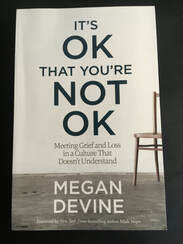 “Loss stuns us into a place beyond any language ... Language is a cover for that annihilating stillness, and a poor one at that.” (Megan Devine, It’s OK That You’re Not OK) 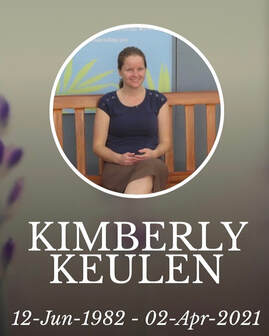 In the months leading up to Kim’s passing, Kim and I talked a couple of times about her memorial. We made a rough plan of what it might look like and who she would like to speak at it, and we talked about a couple of songs we would either sing or have played. We also talked about timing of the memorial, and that she wanted us to wait until after COVID was over so there wouldn’t be any restrictions on who could attend. Kim wanted everyone who wanted to attend to be able to do so. She was always thinking of others. When we made these plans, all signs pointed to COVID-19 being significantly weakened, if not in our rear-view mirror by the end of summer 2021. The vaccine was rolling out, and summer was coming. What we didn’t know was that the fourth-wave of COVID was also about to begin. As you now know, we were not able to honour all of Kim’s wishes. In August, when we met as a family to discuss plans for a memorial, we all felt that if Kim knew the current situation, that the Delta-Variant was now active and growing, and that it was most likely going to spread through schools once September hit, she would most likely have said, “OK, get it done already.” And so, with that, we went ahead and had Kim memorial on September 10th, with a limit of 200 people in attendance and COVID safety measures in place to ensure we did not become a spreader-event and to protect persons like myself. I mention all this as background to this next chapter of my grief. Because we waited five months to hold Kim’s memorial, I believe the experience of her memorial was much different than if we had held it within the first month. In the week leading up to Kim’s memorial, I felt a growing anxiety within me. Not only was I worried about how painful and difficult the actual event of Kim’s memorial would be, but there was something else happening, a feeling I couldn’t put into words. It felt as if a chapter of my life was coming to an end. With Kim’s memorial happening on a Friday night, I had this feeling that something was going to happen over the weekend, that there was an "opening," an abyss, that was about to engulf me. I felt as if I was coming to the edge of a cliff. I am so incredibly proud of Kim’s memorial. I am thankful to everyone who spoke and how they honoured Kim with their words and stories. Pastor Jenna Fabiano, who officiated, did such an excellent job as well. The musicians also brought such a peaceful atmosphere to the building. I was so grateful that Kim could be honoured in such a powerful way. 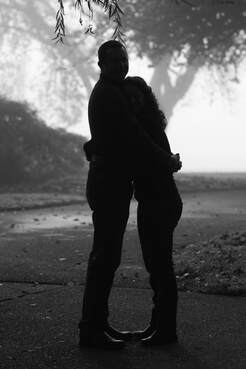 The rest of that weekend, however, just kind of slipped by. I worked on Saturday to try and keep my mind busy (we were in the middle of corn harvest). On Sunday, I stayed in my PJ’s all morning until I went to the farm in the afternoon to work again. But something happened on Monday morning. That thing I had felt inside of me, that change that I felt coming during the previous week, that anxiety, finally came to the surface. Monday, September 13th, was a bright and beautiful morning. I woke up at my regular time, had breakfast, did my lung function tests as I do every morning, and then decided to go for a walk. I was about three-hundred meters from my house, about to cross a street (I can picture it clearly in my mind), when all of a sudden, a phrase came into my head that stopped me dead in my tracks: Today is the first day of the rest of your life. That was it! That was what the growing anxiety, the suspicion of what Kim’s memorial would mean. A new chapter, a new life, was now beginning. But, whereas this phrase, the first day of the rest of your life, is often used in a positive or motivational fashion, this instance of it came with nothing but immense life-piercing sorrow. In the five months preceding the memorial, it still felt like I was somehow living with Kim. I don’t know if it was because of the shock that I wrote about in the previous post, if it was because her passing was still so fresh, or if it was because we had not yet had her memorial; but it felt like Kim was still with me somehow. The chapter had not yet ended. During the summer, I was still anticipating something with Kim. The symbolic book of our marriage, our journey together, had not yet finished. Throughout the spring and summer, there was still something to come that had to do with Kim, something I would still do for her, something that Kim would be part of, that she would be central in. Kim’s chapter had not yet ended. However, with her memorial, and the symbolic nature that memorial services often take on, it was as if the chapter was now closed; and now, on the following Monday morning, I was staring at a blank page. Nicholas Wolterstorff, in this book, Lament for a Son, writes, “Something is over. In the deepest levels of my existence something is finished, done. My life is divided into before and after.” 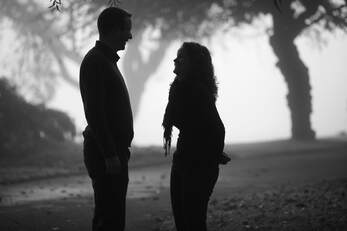 It was as if there was this open space, this empty silence in front of me. It felt like I was expected to move on, that any excuse of not making plans for the future, of finding stability, were now over. There was nothing to look forward to, no more ending point; there was now just a future without Kim. It felt like the chapter, whose title still included Kim’s name in it, was now done, and from here on out, the chapter titles would only have my own name. From this moment on, it felt as if Kim would now exist only in my memory. And each day after the memorial would feel as if I was moving further and further from her. Again, in this book, Lament for a Son, Wolterstorff writes, “It’s the neverness that is so painful. Never again to be here with us––never to sit with us at the table, never to travel with us, never to laugh with us, never to cry with us, never to embrace with us ... All the rest of our lives we must live without [her]. Only our deaths can stop the pain of [her] death. A month, a year, five years––with that I could live. But not this forever.” Here is something I just thought of in writing this (writing always helps me process things). The word “widowed” means “to be empty.” Since Kim's memorial, I have been saying that I have this sense of “openness” in front of me, but I always need to qualify that by saying it is not a good thing. It is like being unanchored in a storm or staring out the door of an airplane with no parachute. But maybe instead of saying I feel this sense of “openness,” I should say I feel a sense of “emptiness” in front of me. I know I feel empty inside. I feel like the shell of the man I was a year ago. But maybe that is also the word that best describes how I feel about the future: EMPTY. 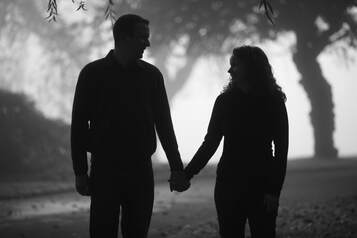 I’ve used part of this quote in an earlier blog post, and I wasn’t planning on using it here, but I think it fits. Again, it is by Nicholas Wolterstorff: “Let me try again. All these things I recognize. I remember delighting in them––trees, art, house, music, pink morning sky, work well done, flowers, books. I still delight in them. I’m still grateful. But the zest is gone. The passion is cooled, the striving quieted, the longing stilled. My attachment is loosened. No longer do I set my heart on them. I can do without them. They don’t matter. Instead of rowing, I float. The joy that comes my way I savor. But the seeking, the clutching, the aiming is gone. I don’t suppose anyone on the outside notices. I go through my paces. What the world gives, I still accept. But what it promises, I no longer reach for. I’ve become an alien in the world, shyly touching it as if it’s not mine. I don’t belong anymore. When someone loved leaves home, home becomes mere house.” I think it felt like Kim had not entirely left before her memorial. But now that the memorial was over, I felt suspended. She is gone for good other than in my memory. Life got back to normal for everyone else, but my life (and those who loved her) would never be the same. I go through the motions of life, and I can find some enjoyment in them, but the big questions of life that matter are left empty; they are unanswered because I don’t know how to answer them. This chapter of discerning this sense of emptiness continues today. When I try to look ahead, it is still an abyss. However, the “purity” of this emptiness lasted only for a week or two after Kim’s memorial, as is was soon filled with a fog of depression. The season of grief that followed Kim’s memorial was maybe not as visceral and unpredictable as certain moments that preceded it in the spring and summer, but it was more profound and painful. As September turned into October, and even as good and exciting things began appearing on the horizon, I started slipping into a depression and fearfulness that I had never experienced before. 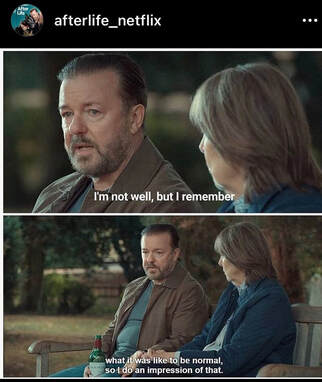 “The reality of grief is far different from what others see from the outside. There is pain in this world that you can’t be cheered of ... Some things cannot be fixed. They can only be carried.” (Megan Devine, It’s OK That You’re Not OK”) As I reflect on the past seven months without Kim, I see that what I might call a “first chapter” of my journey with grief happened during the spring and most of the summer of this year. There are two defining features that I see at play throughout that time. The first was shock; the second was a complete loss of identity. Shock. Back in May 2019, I broke my arm. I was mountain biking in Watershed Park, just minutes from my house. I was riding a downhill trail, one I had done many times before. I came to a tabletop jump whose landing went immediately into a sharp right-handed bend. I hit the jump fine, but in landing, my rear wheel hit the edge of the tabletop, which then ejected my bike forward straight into the high-side of the lefthand berm. My front tire hit this wall of dirt, and my bike and I went flying through the air, wheels over handlebar. While flipping over in the air, I remember thinking, “don’t worry, you’ll be okay, you’ve crashed hard before.” However, when I hit the ground and came to a stop (sitting upright), I noticed that I was covered in blood. I then looked at my right arm and saw that it was bent in a way it was not supposed to ever be bent, and there was a bone sticking out of it. In the three seconds it took to realize how much trouble I was in, I remember thinking, “Please, shock, do what you were made to do!” 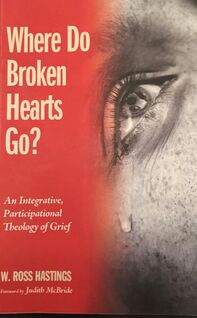 Ross Hastings, a professor of mine at Regent College, and whose wife passed away from cancer in 2008, has written a book on grief, Where do Broken Hearts Go? In it, he writes, “For one thing, when a loved one dies, no matter how well prepared we think we are, we shut down in various ways and to different degrees. We are in shock ... Shock, our involuntary defence mechanism, is actually a gift.” Before reading these words in 2016, the same year that Kim was first diagnosed with stage-four colon cancer, I had always thought that shock was a bad thing, that it was somehow an escape from reality. A weakness or something that wasn’t the best way to process or move forward (to be sure, one cannot live in a state of perpetual physical shock; its symptoms can kill a person. When I broke my arm, I experienced many of those symptoms: drop in blood pressure, profuse sweating, skin turning grey or white). But what I didn’t understand before reading this book is that shock is actually a saving grace. Shock is a natural way for the body to survive, for short periods of time, immense life-threatening pain. Back in 2019, sitting beside a tree with a bone sticking out of my arm, shock is what gave me the survival instinct and ability to stand up (albeit on the edge of fainting) and walk/shuffle out of the forest so that the ambulance could pick me up and bring me to the hospital as fast as possible. In the same way, in the immediate days, weeks, and months after Kim passed away, shock was one of the main things that helped me survive what would have been insurmountable emotional pain. Sitting here today, most of the spring and summer is a blur to me. Most of my memories from just a few months ago are swallowed into an indistinguishable mass. There are things I know I did, people I met, family I spent time with, but the details are a fog. Meeting a friend at White Rock beach on several occasions to watch the sun go down and share memories of Kim. Having a close friend come over for drinks to check in on me. Getting together with Kim’s family, where one of Kim’s brothers made all of our drinks a little stronger than usual, thus helping dull the fact that Kim was so painfully missing. And, of course, putting in a lot of time working on the farm. But many of those memories are a blur. What was said, and the number of times they were repeated, is all lost. I was in survival mode. I knew I needed to talk to people, so I sought out friends, or they sought me out. I knew I needed to get out of the house, so I went for drives, walks, bike rides, or sat on the beach. But looking back, it is as if I was on autopilot and I wasn’t taking anything in. I was trying to survive until the following day, just putting in time. The shock prevented the pain of Kim’s absence from reaching the core of my being, but it also stopped everything else in life from penetrating as well. Now don’t get me wrong. In the weeks and months after Kim passed, there were moments of incredible pain. Times where I would be lying face down on the couch, pounding the pillows with everything I had, and expelling groans too deep for words. In those moments, I didn’t know how I was ever going to go on. There were times I wept openly in front of friends and family. Times I felt I couldn’t go on and didn’t want to go on. But despite those moments of complete disorientation, I was also able to function in ways that surprised me. It was as if the shock would let off a pressure release of grief so that I didn’t explode, but it also protected me from feeling the full impact so close to the event. 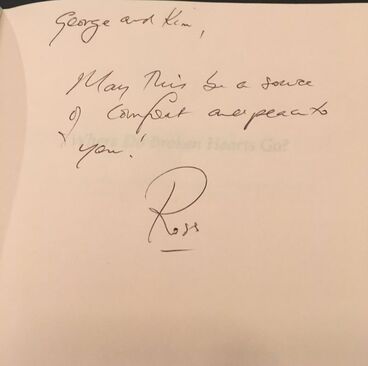 Kim and I attended Ross' book launch just months after Kim's initial diagnosis. He signed our copy appropriately. Kim and I attended Ross' book launch just months after Kim's initial diagnosis. He signed our copy appropriately. “With shock comes numbness and an unintentional sense of denial. Our minds cannot grasp it. Our emotions are too powerful to be processed at that time. If we did not have defence mechanisms in place, we would not be able to handle the reality of our losses. Their full impact would kill us.” (Ross Hastings, Where do Broken Hearts Go?) 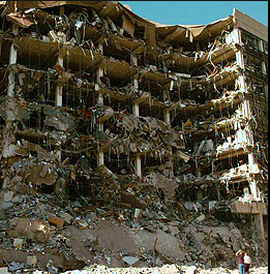 This idea of being in shock was not something I was totally aware of at the time (at least, I don’t think I was). It was not until August began winding down and I entered into some deeper reflection that I realized how much my internal defense mechanisms had protected me during the first four months of being without Kim. Identity The second significant piece of my grief puzzle, however, had to do with my identity. One thing that I did feel within the first weeks after Kim’s passing was a total and complete loss of identity. In being married to Kim, we had created an identity together. We didn’t lose our individual identities to each other, we were still two very different people, but we had also come to create a new identity as one person. With Kim now being gone, it was as if half of me had been torn away. I felt like a building you might see on the news, where half of it has been bombed to rubble, and so each floor of the building ends in midair, and wires and pipes are sticking out into nothing. I felt like my identity had been cut in half, ripped apart. And with this came a total loss of confidence. I think I am a fairly courageous person. Through life experience, I have come to see that there is not a lot in life that we can have control over or hide from, and so it is often better to just hit difficult situations head-on. However, I am not a confident person. Never have been. As a kid, I would always get sick to my stomach before hockey games. I feel I am often timid in social settings where I don’t have a leadership role. But never has my lack of confidence been more acutely felt than now, without Kim. I didn’t realize it until she was gone, but I ran almost everything I did past her. Something as simple as what to wear to church when I was preaching; I would always come downstairs after showering and dressing, stand in front of Kim, and ask, “Is this okay?” Whenever I would purchase something (other than books), I would ask what she thought. We would often go for walks in the evening, sharing about our day, talking through all our decisions in life. I am an over-thinker, and so often, the only way I would make a big decision was when Kim would finally say, “Just do it already.” 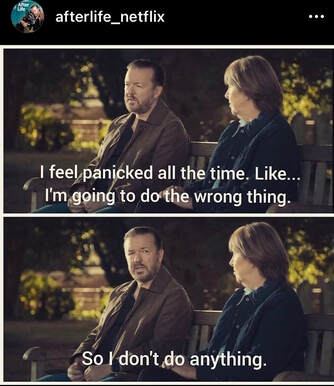 With her gone, I now feel paralyzed and panicked. This summer, when I began making final edits and approvals for my book, I broke down. I had no clue if anything I was rewriting was any good, if it made sense, or even fit in my story. I had no clue how to pick the image and design for my front and back cover. I felt hollow. Thankfully, my sister-in-law, Heidi, who has a very keen eye for design and was excited to help with my book, walked me through the final half-year of publishing. I no longer knew who I was, what I liked, or what I wanted. I had lost my identity, I had lost all confidence. The final quote I will use from Ross Hastings' book is this: “I think grief is the process of shock thawing out.” Sitting on the side of 64th Avenue back in May 2019, a truck-load of firefighters standing around me, I knew that my shock was soon going to dissipate. Now that I was out of the woods, first responders present, my body was beginning to feel safer. The paramedics arrived within minutes. They wrapped my arm, got me onto the stretcher, and loaded me into the back of the bus. The driver closed the doors, walked around the side of the vehicle, got behind the wheel, and we were off the hospital. At that point, my body relaxed. I was safe. But it was then that the pain of my broken arm and shattered elbow hit me like nothing I had felt before (transplant included). For the rest of that ambulance ride, I was sucking back on the laughing gas as hard as I could. As August of this year turned into September, I began feeling some semblance of safety. I was starting to take some steps in feeling comfortable with myself, comfortable being alone in the house, and discovering a bit more of who I now was and who I wanted to be. But like being in the back of that ambulance, as I was beginning to feel safer, the pain also began hitting much more powerfully. Kim’s memorial was now less than ten days away, and I knew something was going to happen. I knew it would be incredibly painful and that the shock of spring and summer was thawing. But in the days leading up to Kim’s memorial, I knew that something else was brewing, something I couldn't put into words. I could sense an abyss opening up in front of me. I just didn’t know what it was. It’s official. My book is now available for purchase!
You can click here to be redirected to my book page, and all the buying options are at the bottom of that page. Though it may take a week or two longer to receive the book, I would encourage you to consider buying from the FriesenPress Bookstore. It supports indie authors like myself, and the cost of the book is also much less expensive! Thank you for all your support and interest in my book! 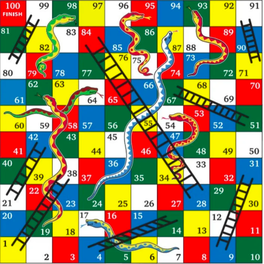 Do you remember the board-game, Snakes and Ladders? It was a simple game where the players would roll the dice and see how many spaces up the switch-backed game board they could go. On some of the squares that the players would land, there would be a picture of a ladder extending up the game board. The player could then move their playing piece up the ladder to whichever square the ladder ended on. Thus, you could be propelled forward anywhere between 10 to 60 spaces. On other squares, however, you could land on the head of a snake, in which case you would slide back down the game board to wherever the snake's tail was, and thus you would lose anywhere between 10 to 60 spaces. I liked playing this game because it was a game of chance, thereby meaning that as the youngest in my family, I had a chance of winning; probably the only game I ever had a chance of beating my older siblings or parents at. Snakes and Ladders is the closest I've come to finding an appropriate metaphor for my journey of grief over Kim’s death. Each morning I wake up, and I wonder what kind of square I will land on that day. Will it be a neutral square where I'll sit where I am, and the day will pass with either a sense of numbness or relative peace? Will it be a day where I will find a "ladder," and I'll feel like I'm making some progress in finding a new normal and some new meaning; an advent of joy perhaps? Or will it be a day where I land on a "snake," find myself once again losing a grip on life, and sliding back into what feels like ever-deepening pits of sorrow and despair. What I’d like to do over the next couple of weeks is begin writing about some of this journey I have been on since Kim passed. As I reflect back over the seven months and two days since Kim died, I can see four or five chapters to this short story. My first blog entry about my journey with grief will be on the shock I experienced throughout the spring and summer. For some reason, I used to think that shock was a bad thing. I’d hear that someone was in shock and believe that it was something they needed to overcome, or maybe it was a sign of weakness. However, I’ve come to see that shock is the natural response of the body to survive a situation that is too painful to experience in full. I can see now how much of the spring and summer were spent in shock, and my body and emotions were taking a bit of a summer holiday from the hard work that it subconsciously knew it would have to do. The second chapter of this mini-series will be on Kim’s memorial. I felt a growing fear and anxiety in the week leading up to it. I felt that something was going to change, but I could not put into words what that was. Then, the Monday morning following her memorial, the realization of what that anxiety was hit me, and it felt like a dark abyss opened up in front of me. The third blog entry, Lord-willing I get there, will be about the ever-deepening darkness and numbness of October, precisely the complicated emotions over finishing up my book, Thanksgiving, and dealing with some challenges and unpredictability related to my health. The fourth entry will have to do with the season I am in right now (hopefully, I will still feel up to writing about this in a week or two). The last two weeks have seen a reprieve of the dark emotions. Some self-realizations during this time have even brought some glimmers of contentment. This all has to do with the little things of life and beginning to take a few tentative steps into the unknown. And lastly, I will give an update on how I am doing when I finish this series. I can’t begin to imagine how I will be feeling at that time, so I’m not even going to try. As I have alluded, I have not written any of these entries yet. I have a sketched outline in my notepad and a couple of quotes I might use, but that is it. I can guarantee you this writing is something I want to do, and I intend to do it, but I don't know whether I can do it. One part of grief is that it is unpredictable. I plan to write two blog posts a week, but I can’t promise that will happen. Part of getting a look into my journey with grief is also having to journey and wait with me. So, if I all of a sudden go silent, you can guess I woke up one morning and stepped on a snake, thus sliding back down into the emotional paralysis of sorrow. On the other hand, if I wake up tomorrow and hit a ladder of excitement, well, then maybe all five entries will come out in one week (I can promise you this won’t happen).
Some of you may not be interested in this, or maybe it won’t be healthy for you to read it, and I understand that. I am doing this more for myself than for the reader, so there is no pressure to read this or follow along. I am putting this out there to document some of what I have been going through, and if there is someone else who is going through a similar kind of loss, then perhaps there is something in my rambling that can help or be a companion for you. I will hopefully see you next week with my first blog entry into this mini-series on my journey with grief. 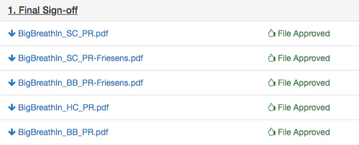 Finished Product. I have officially finished my book! I have approved the final manuscript, and the book is being sent off to the publisher and printers as I write this. It feels surreal to be done with all the editing and not have any more work to do on the book itself. (I will say, in my final read-through, I did find three grammatical/typo errors, which means if I found three, then there are probably more. Some imperfections are always a good thing though, right? These are the hazards of self-publishing). I still can’t believe the book is only about two weeks away from potentially being in your hands! Sticker Shock! I'll admit that I'm not all that happy with the pricing of the book. My publishing specialist and I worked hard on finding a reasonable price, but it ended up being higher than we wanted. Like everything in this time of COVID, book prices have gone up. This has to do with supply chain shortages within the industry. Also, coming in at 294 pages, the book is considered long, which also sets the price higher. I can guarantee you that my royalties for each book are minimal, so this is by no means a cash grab by the author or publisher. I wanted to price the book under $20, but just so you are aware, if you are buying from online retailers, you can expect the book to be listed over $20 (the e-book will obviously be much less expensive). Also, as a disclaimer, it might be listed more than we recommended, as we don’t have control over how much Amazon or others will price it at first, so you may see varying prices in the first couple of weeks. 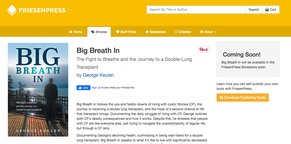 Where to Buy? Once I am notified that the book is available, I will let you know! All the online buying options will be listed on my website. As I’ve mentioned before, the book should be available from all online book retailers. It will most likely first appear on Amazon, then a day or two later on Chapters/Indigo, Barnes and Noble, etc. It will NOT be available in brick-and-mortar stores, other than some small independent stores I might approach in the Lower Mainland. Another place you can buy it, and where I would encourage you to purchase, is the FriesenPress online bookstore. We can list the book for cheaper on the FriesenPress bookstore, although shipping might be a bit more, and it might take a bit longer to get the book (but what's the rush). Also, in full disclosure, my royalties are higher on these sales as FriesenPress takes very little from each sale (they are an awesome company). Their mission is all about promoting authors. They are a Canadian company based in Victoria. They give indie authors like me a way to get our stories out into the world much easier than the traditional publishing route. So please consider supporting them, and while you are there check out some of the other books/authors that they publish! For family and friends who live close by, I intend to do a “soft” book launch later in the month. I will pick a Saturday probably in late November where you can come by my garage and pick up a copy of the book. 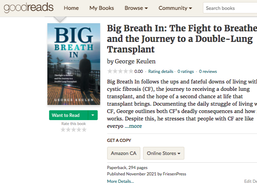 Lastly, the book is already up on Goodreads, so if you read the book and enjoy it, and if you'd like to leave a review, you can do so there. It would be much appreciated! Thank you for all of your support thus far. The interest in the book genuinely humbles me. I am getting more excited to have my CF and transplant story out there and for people to learn more about this horrible disease and the complex journey it is to receive an organ transplant. |
George Keulen's BlogWelcome to my blog. This is a place to find periodic updates on life's ups and downs as I face some old/new health challenges. Some of the updates will be written by me, while others will be updated by my wife, Carrie. Archives
July 2024
Categories
All
|
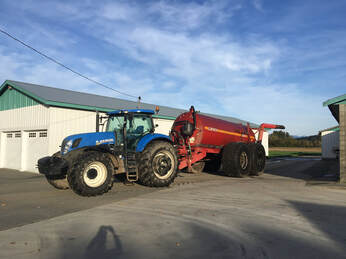
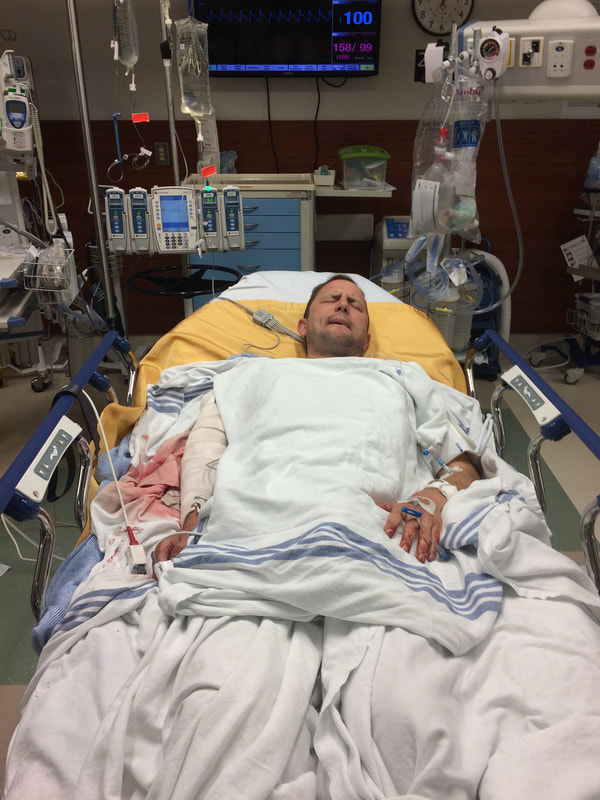
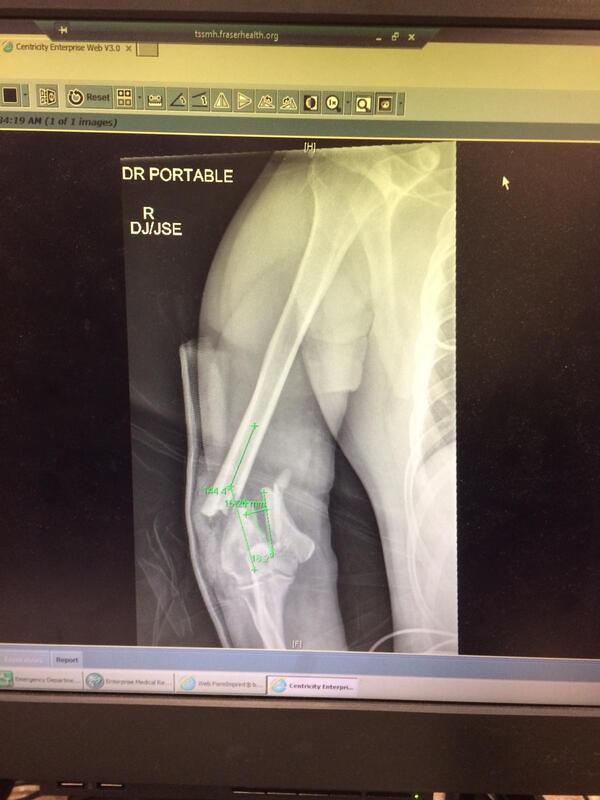
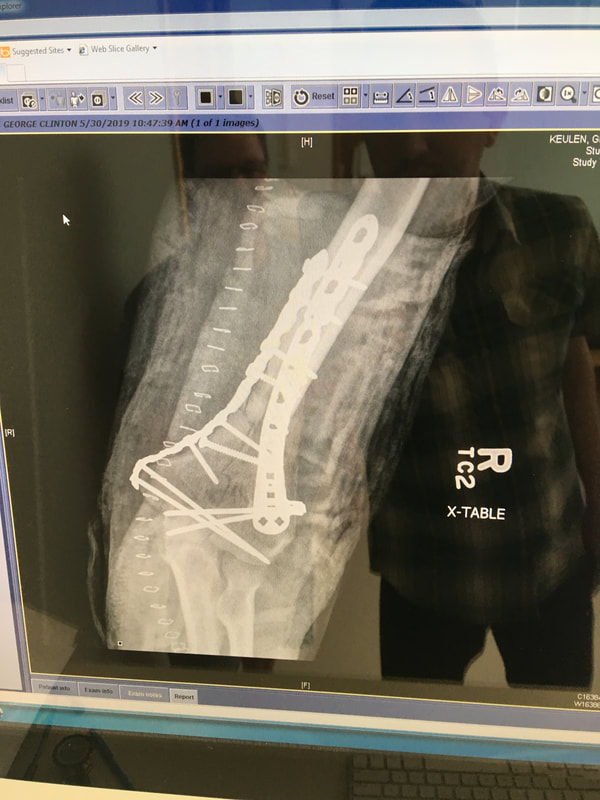
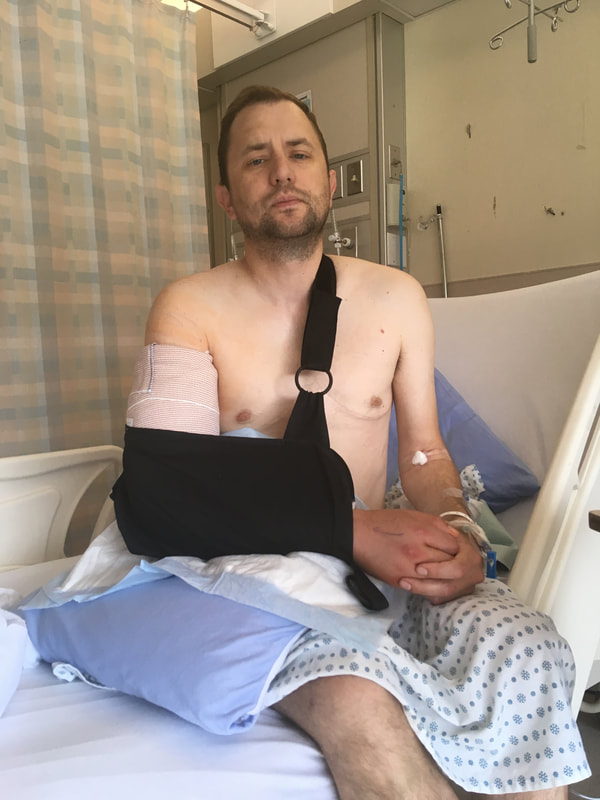
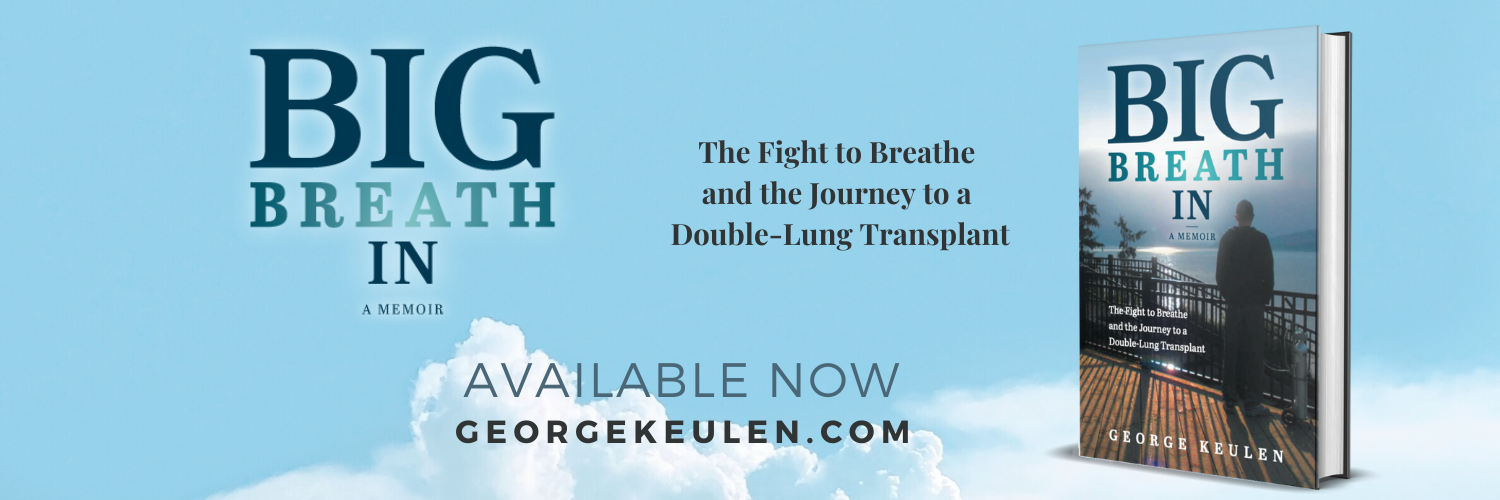
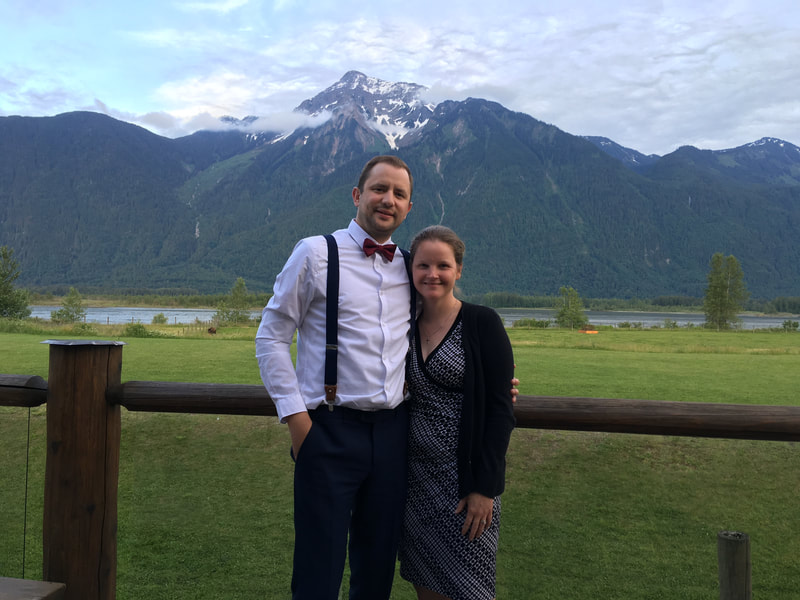
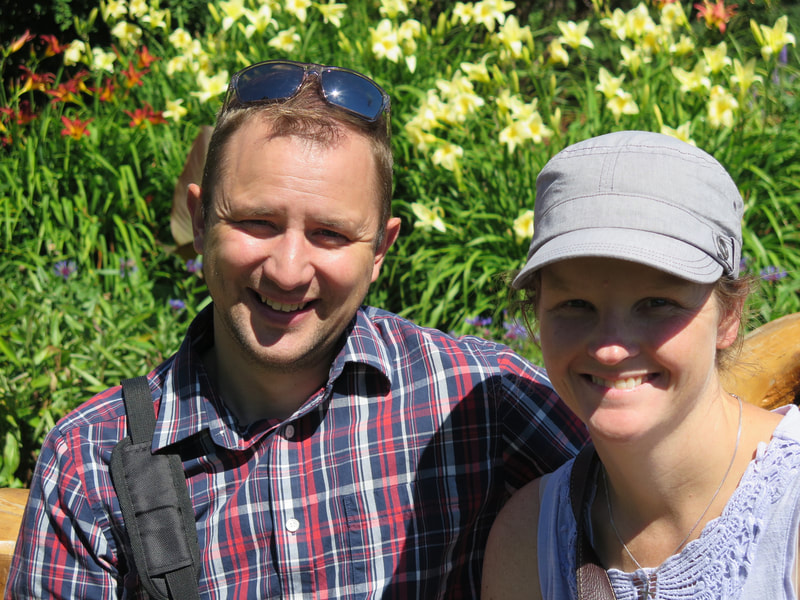
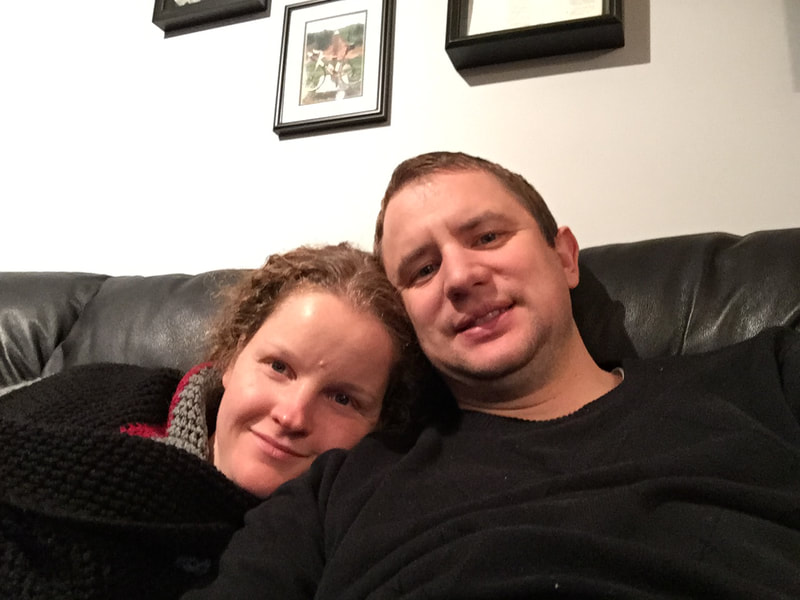
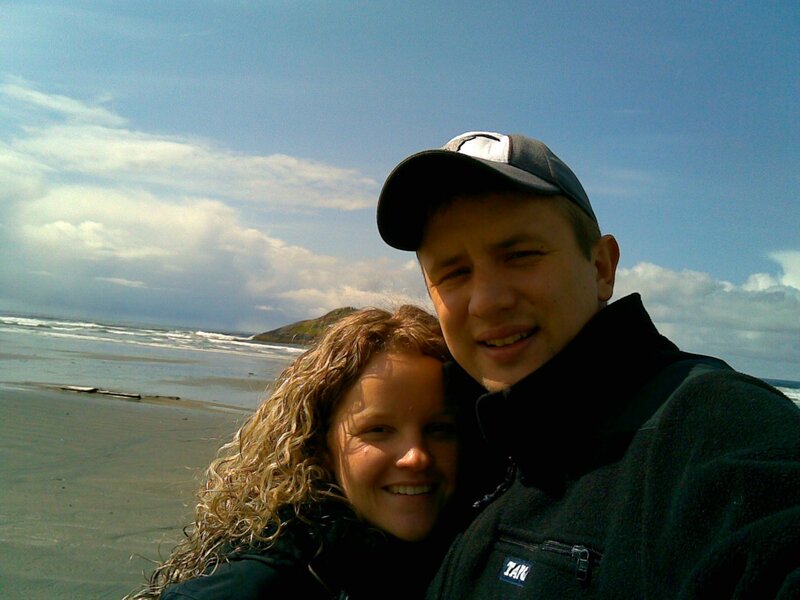
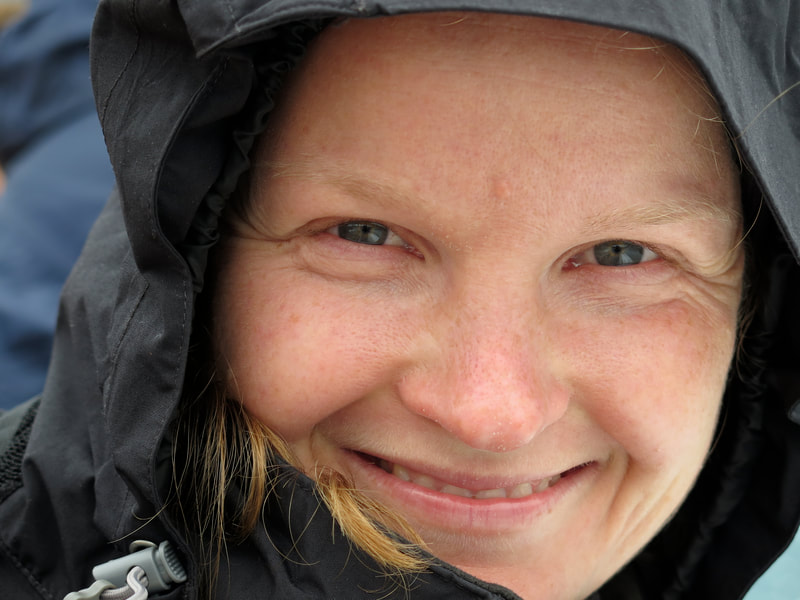
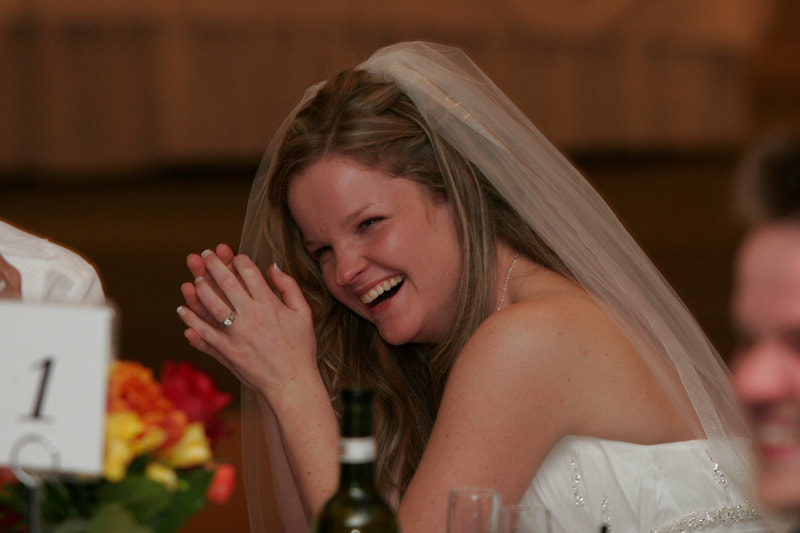

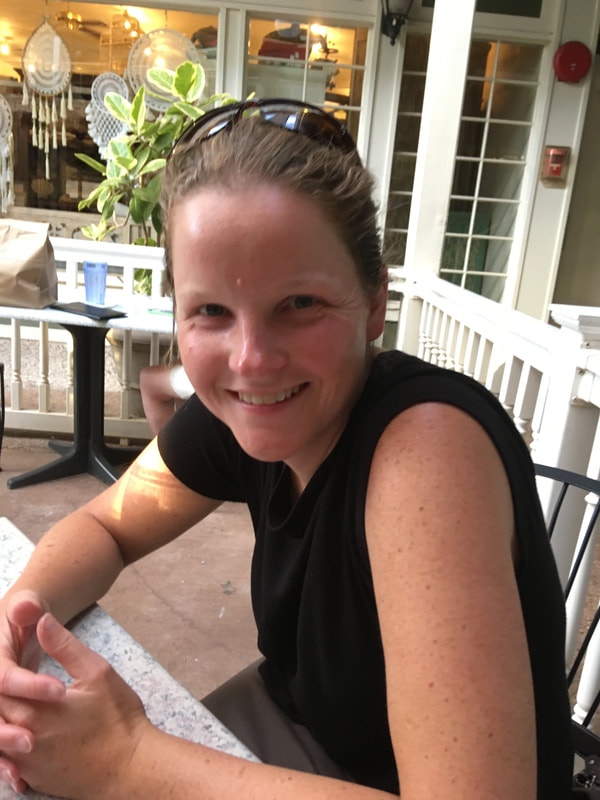
 RSS Feed
RSS Feed
